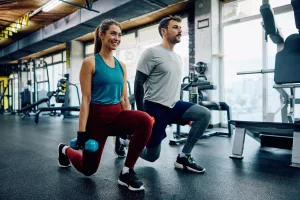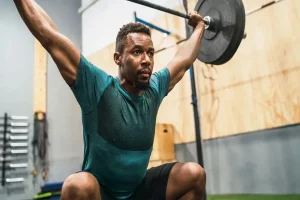Why Exercise Matters for Good Physical Fitness

Physical fitness is an important part of a healthy lifestyle and exercise is an essential aspect of physical fitness. There are so many good things for your body you’re getting by working out that go beyond burning calories, like heart health and overall strength and [mental] health and lifespan. In this in-depth article we look at the role that exercise plays in good physical fitness explaining the physiological, psychological and sociological factors that contribute to our need to engage in regular physical activity.
The importance of exercise in the improvement of cardiovascular fitness
One of the biggest reasons why exercise is important for physical fitness is because of its effect on cardiovascular health. Repeated aerobic activities such as running, cycling, swimming and fast walking make the heart and lungs work more efficiently. The heart is a muscle – moderate exercise strengthens it, so it works more efficiently.The resting heart rate may be decreased, blood pressure may be lower. This reduces the chance of chronic diseases such as heart attacks, stroke and hypertension.
And regular exercise also benefits circulation as it allows blood vessels to be more pliable, also helping to lower cholesterol. The decrease in levels of LDL (bad) cholesterol and the elevation of HDL (good) cholesterol results in arteries that are more open and plaque that is less likely to accumulate, which are two factors that can inhibit the development of atherosclerosis.
The Role of Exercise in Improving Muscular Strength and Endurance
Being in shape is not just about having a healthy heart but also having a good amount of muscle strength and endurance. Muscle fibers are activated with resistance training and weight-bearing exercises, causing them to grow and increasing muscle endurance. This enhancement of muscle power results in increasing capabilities in performing the activities of daily living, less risk of injury and most importantly improved posture.
Strong muscles are also important for supporting joints and preserving skeletal integrity. Weight bearing exercises promote bone density enhancements, which can also lessen the risk of fractures and osteoporosis with increasing age. Regular exercise helps to tone and flex muscles, making them respond better for good balance and coordination.
Benefits to the Metabolism
One of the most fundamental elements of physical fitness is a healthy body composition. Physical activity is crucial to achieve energy balance. Excercise raises metabolic rate, which helps the body burn calories and not store exces fat. In addition to calorie burning during the workout, excess post-exercise oxygen consumption (EPOC) boosts your metabolism for hours after the workout, adding to the fat-loss benefits.
Physical activity also has a positive effect on insulin sensitivity and glucose metabolism. This is very important in terms of prevention and treatment of metabolic diseases, including type 2 diabetes. Active muscles burn glucose more effectively, driving down blood sugar and steadying the flow of energy over time.
Psychological and Cognitive Benefits of Exercise
Physical activity is good for the body—and for the mind. The frequent exercise promotes the production of neurotransmitters – for example endorphins, serotonin and dopamine, which are nature’s mood boosters. This biochemical response alleviates depression, anxiety, and stress symptoms and helps to build mental fortitude.
And exercise has been associated with better cognitive functioning, too – from memory and attention to executive functioning. Research suggests that exercise has a role in the production of new brain cells, or neurogenesis, in the hippocampus, the area of the brain responsible for learning and memory. So exercise is not just an overall wellness strategy but a key plan for mental longevity.
Exercise and Immune System Optimization
Exercise also keeps the immune system working at its peak performance. Moderate workouts have in research studies sparked the circulation of immune cells throughout the body, enriching the bloodstream with the better surveillance system it needs to detect invaders. This increased immune vigilance means you get fewer and less severe infections such as colds and flu.
Nevertheless, it is important to realize that, although moderate exercise enhances immune function, extreme exertion without sufficient recovery may suppress immune processes on a transient basis. A balanced form of exercise is thereby crucial for immune health.
Psychosocial And Lifestyle Benefits Of Exercise
Now, exercise itself is often a social activity, via group fitness classes, sports teams or community fitness events. These ‘make you use’ engagements are good for mental health, motivation and accountability. Regular physical activity promotes regimentation, which also might extend to other areas of your life like nutrition, sleep habits, and stress management.
In addition, exercise helps to improve sleep quality by controlling your internal body clock and lowering insomnia. Sleep is a vital part of being physically fit and healthy, and promotes recovery and recuperation.
Adapting Exercise for Long-lasting Physical Fitness
It is good to know that the effective exercise for physical fitness should personal, moderate and regular. When you mix your intervals in a program with strength-training, flexibility workouts and balance exercises, you’ll have a suitable full body routine. This comprehensive approach to training, which targets all aspects of fitness, helps ensure an overall healthier you and decreases your chances of developing an overuse injury.
By tailoring exercise intensity and mode depending on personal purposes, age and health, it is a more sustainable, efficient outcome for long-term exercise. It keeps you motivated and helps to keep you progressing.
Conclusion
In short, exercise isthe bedrock upon which physicaladvantage. It has numerous benefits, from heart health and stronger muscles, to improved metabolism and immune function. In addition, exercise enhances social health and maintenance of healthy lifestyle habits making the quality of life and lifespan longer.
Regular, well-organized bodily activity is absolutely essential for those who want to develop and maintain the best degree of fitness. And by making regular, consistent exercise a lifelong commitment you tap into the sort of deep health dividend that truly makes your impact with everything you do in your life.



